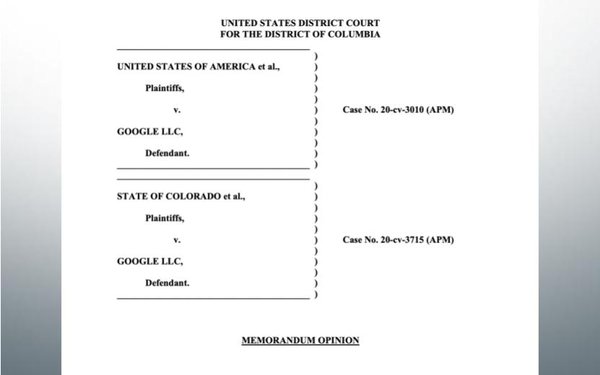
Google will not
be allowed to enter into any exclusive distribution contracts for Google Search, Chrome, Google Assistant and the Gemini app for six years, under an order issued Tuesday by U.S. District Court Judge
Amit Mehta in Washington, D.C.
But Mehta rejected a request by the government to force Google to divest the Chrome browser and the Android operating system.
"Plaintiffs
overreached in seeking forced divesture of these key assets, which Google did not use to effect any illegal restraints," the judge wrote in his 230-page order.
The order, which aims to remedy antitrust violations, comes more than one year
after Mehta found that Google monopolized search by arranging to serve as the
default search engine on browsers operated by Apple and Mozilla, as well as on Android devices.
advertisement
advertisement
Mehta specifically ruled last year that Google maintained a monopoly in two markets: general
search services and search text ads.
Among other terms, Mehta's order requires Google to share some data about users' searches with "qualified" competitors, and to publicly disclose material
changes to its ad auctions.
Google had argued to Mehta that sharing users' search data would endanger their privacy. The tech industry group NetChoice backed Google's argument,
writing in a friend-of-the-court brief that it would be "beyond reckless for the government to demand Google hand over data its consumers have entrusted to them to anyone who asks.”
Mehta said in his order that Google had a "valid concern" regarding privacy, but that experts testified that "user privacy could be preserved with appropriate privacy-enhancing
techniques and methods."
"That is not to say that protecting privacy will be easy," Mehta wrote, adding that "anonymizing and securing" large datasets while also "attempting to
optimize their usefulness" will be challenging.
Mehta also denied the government's request to prohibit Google from paying Apple and other companies to distribute Google
Search.
"Google will not be barred from making payments or offering other consideration to distribution partners for preloading or placement of Google Search, Chrome, or its
GenAI products," Mehta wrote. "Cutting off payments from Google almost certainly will impose substantial -- in some cases, crippling -- downstream harms to distribution partners, related markets, and
consumers, which counsels against a broad payment ban."
He noted that a ban on paying Apple -- which received an estimated $20 billion payment from Google in 2022 alone --
could increase Google's profits from search.
"Freed of having to pay billions in revenue share, Google’s profits would increase. Not paying Apple alone would result in a
windfall worth tens of billions of dollars," he wrote. "Google then could use those profits to improve its products and monetization, further propagating the network effects flywheel that has proven
so difficult to disrupt."